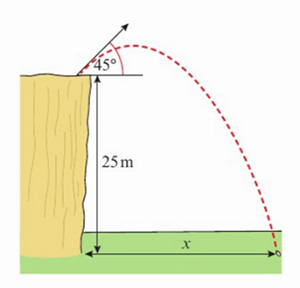








AS Course Outline
What is Mathematics AS?

Mathematics is reasoning with quantities. If you are looking at studying a subject where data analysis, numerical aptitude or logical thought is valued, then an AS in Mathematics can provide an excellent introduction to these areas. AS Mathematics gives insight into the ways in which Mathematics can be used to model and analyse the world around us or create abstract ideas with far-reaching consequences. If you are thinking about continuing your study of Mathematics beyond AS, then this course will give you an excellent insight into the mind-set and skills required. You will need to be a strong logical thinker with the ability to manipulate quantities, both known and unknown. If you are able to achieve a 5 or above at GCSE then you stand a good chance of being a suitable candidate for AS Mathematics.
What skills will students develop when studying AS-level Mathematics?
AS Mathematics extends the approach of GCSE and challenges you to think on a more rigorous basis. You will be expected to solve problems with many stages, planning out and working your way to solutions neatly and concisely. A strong algebraic vein also runs through the course.
You will be introduced to all the fundamental functions of Mathematics in the AS course. Starting off, in Pure Mathematics, with simple linear equations, the course builds up your knowledge so that you can analyse 'general polynomials' with higher powers of x, both graphically and algebraically. Trigonometry from GSCE will be built upon and a powerful algebraic technique called calculus is introduced.
You will also study Applied Mathematics: Mechanics and Statistics. In these you develop a sense of Mathematics as a tool for modelling the real world. You will discover the reasons for, as well as the restrictions of, mathematical models in a variety of contexts. In Mechanics, Newton's equations of force and motion, stability and vectors are the main fields of study. Statistics expands on the probability studied at GCSE and formalises the idea of a line of best fit. New concepts are introduced, such as the normal distribution, which is a distribution of results found throughout the natural world.
| MATHEMATICS (PEARSON) AS Course Outline | |
|
Course Content Pure Mathematics: Algebra and functions; coordinate geometry, differentiation and integration, equation of a circle, trigonometry, exponentials and logarithms, vectors, geometric interpretation of calculus. Statistics: Statistical sampling, representing and summarising data, probability, correlation and regression, statistical distributions and hypothesis testing. Mechanics: Modelling physical systems, quantities in mechanics, motion in a straight line, Newton's laws, applying vectors to 2-dimensional forces, and moments. |
|
Structure of the Course
This course will be taught for 5 lessons per week. Homework is set at the end of each session and deadlines for submissions must be met. A full set of notes and examination questions is provided.
Calculator Requirement
Casio FX-991EX / FX-991CW Scientific Calculator
Core Textbooks
Edexcel AS and A level Mathematics Pure Mathematics Year 1/AS Textbook
Edexcel AS and A level Mathematics Statistics & Mechanics Year 1/AS Textbook
|
Additional Reading
'Why do buses come in threes?' By Rice, Wyndham & Eastaway
|